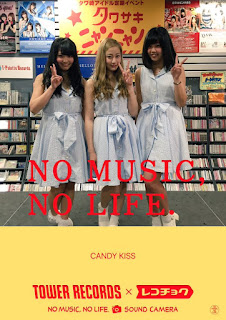For those who didn't know, there is a new documentary film that is now playing film festivals named TOKYO IDOLS. The film was directed by Kiyoko Miyake, a Japanese woman who grew up in Japan but later moved to the U.K. She made this film due to her curiosity about the phenomenon of Japanese idol culture. In the film she profiles some indie idols who are working towards the possibility of becoming artists, but this film is also as much about the fans. I haven't seen it yet due to it not playing anywhere in my area, but I am hoping there will be a DVD release in the near future. Here is the film's trailer.
I feel a film like this is one of the most important things to happen in the Japanese idol industry in some time. While Japanese entertainment such as films and anime and certain types of music has become part of the mainstream in countries around the world, idol music is still not widely accepted. Many mainstream idol groups already have several DVD and Blu-ray releases of their concerts and even documentaries that focus on their group, but an overview of the industry itself and indie idols in particular has not been done until now. I am extremely pleased that the trailer features "Let's go out" by amorecarina as its opening song and has many clips of this group too. I am proud of the fact that I was the first to write about amorecarina in English. It seems as if this footage of amorecarina was shot in 2015 as the clips feature members in the group that have now graduated. I really wish I could see this movie on a big screen since seeing amorecarina larger than life would be the biggest thrill for me! I have never seen them in concert and since all of my favorite members are now gone, this film seems to be the next best thing for a fan like me.
I have been reading reviews of the film online, and while they mostly praise the film itself, the reviews are written by people who are new to this music. This means the reviewers are tossing around words like "disturbing" to describe the relationship between the fans and the singers. While I certainly understand this reaction to a person exposed to this music for the first time, there is way more to this music than meets the eye. The music of Japanese idols is generally meant to inspire happiness and good feelings among the fans. We live in a world where dark, bleak entertainment is the new normal and anything lighthearted, cute or genuinely funny is dismissed as strange or old fashioned. For me personally, I smile and feel good whenever I hear songs I like (from any genre) and idol music gives the feeling that something good and beautiful does exist in this world. Music is what I need to heal and feel more comfortable with being alive. Without music I feel hopeless and even more depressed than usual. A good idol singer who is really giving her all to her performance makes me want to cheer her on. I often wish I could meet them and shake their hands and tell them in their own language how much their songs mean to me. Sadly, I have no way to talk to them since I have never learned Japanese and I have too many health problems now that I am incapable of traveling.
Another thing discussed in the film and by the reviewers is gender identity in modern Japanese society. The idols are being portrayed as male fantasy objects. Again, I can see this. I think a lot of this is being done by the companies who produce these groups to make them more appealing to males than females. Idols have to look vulnerable and needy for their mostly male audience to feel comfortable enough to approach them. Girls who look like they can take care of themselves are not in need of male protectors and may even intimidate the men. So why are men the ones so interested in these younger girls and not the girls who are the same age? Good question. It may have to do with the way women in today's society are more independent and not in need of men, so the men look towards girls who are are not as independent. Men want to be the provider and caretaker and this is being denied some men in modern society.
I'd like to share some more videos with the director of TOKYO IDOLS. I think she has a distinct vision of what this is all about and may be able to explain things even better than me.
If you are lucky enough to be near a festival playing this film, then by all means try to see it!








